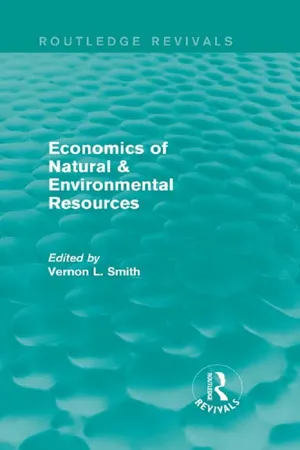
eBook - ePub
Economics of Natural & Environmental Resources (Routledge Revivals)
Vernon L. Smith, Vernon L. Smith
This is a test
Compartir libro
- 506 páginas
- English
- ePUB (apto para móviles)
- Disponible en iOS y Android
eBook - ePub
Economics of Natural & Environmental Resources (Routledge Revivals)
Vernon L. Smith, Vernon L. Smith
Detalles del libro
Vista previa del libro
Índice
Citas
Información del libro
First written in 1977, Economics of Natural and Environmental Resources presents a collection of articles written in exploration of the economic, social, and ecological problems peculiar to natural and environmental resources. Whilst focusing on the economic theory of natural resources, the contributions also consider geological, technological, and institutional features of particular resources. Policy implications and considerations are central to the text and although the book was published over thirty years ago, the issues discussed remainrelevant to today's society.
Preguntas frecuentes
¿Cómo cancelo mi suscripción?
¿Cómo descargo los libros?
Por el momento, todos nuestros libros ePub adaptables a dispositivos móviles se pueden descargar a través de la aplicación. La mayor parte de nuestros PDF también se puede descargar y ya estamos trabajando para que el resto también sea descargable. Obtén más información aquí.
¿En qué se diferencian los planes de precios?
Ambos planes te permiten acceder por completo a la biblioteca y a todas las funciones de Perlego. Las únicas diferencias son el precio y el período de suscripción: con el plan anual ahorrarás en torno a un 30 % en comparación con 12 meses de un plan mensual.
¿Qué es Perlego?
Somos un servicio de suscripción de libros de texto en línea que te permite acceder a toda una biblioteca en línea por menos de lo que cuesta un libro al mes. Con más de un millón de libros sobre más de 1000 categorías, ¡tenemos todo lo que necesitas! Obtén más información aquí.
¿Perlego ofrece la función de texto a voz?
Busca el símbolo de lectura en voz alta en tu próximo libro para ver si puedes escucharlo. La herramienta de lectura en voz alta lee el texto en voz alta por ti, resaltando el texto a medida que se lee. Puedes pausarla, acelerarla y ralentizarla. Obtén más información aquí.
¿Es Economics of Natural & Environmental Resources (Routledge Revivals) un PDF/ePUB en línea?
Sí, puedes acceder a Economics of Natural & Environmental Resources (Routledge Revivals) de Vernon L. Smith, Vernon L. Smith en formato PDF o ePUB, así como a otros libros populares de Economia y Economia ambientale. Tenemos más de un millón de libros disponibles en nuestro catálogo para que explores.
Información
CHAPTER 1
SOME EXTENSIONS OF THE ECONOMIC THEORY OF EXHAUSTIBLE RESOURCES
MONTANA STATE UNIVERSITY
This paper represents an attempt to extend that body of theory referred to in the literature as the “Economic Theory of Exhaustible Resources.” An analytical model is presented that describes the optimal time-path of production for a decision-making unit exploiting an exhaustible natural resource under two differing sets of assumptions vis-a-vis conditions of resource-supply. In Case 1, centralized management of production from a common property resource is considered [14]. In Case 2, the decision-making unit is the firm, which is assumed to be the sole owner of a given resource-stock as in the theory of the mine [2], [6], [9], [13].
The results extend those derived in earlier works primarily in three ways: (1) With reference to the “theory of the mine,” the analytical description of the firm's optimal time-path of exploitation, under conditions where costs are affected by cumulative production, is expanded and clarified. (2) The optimum time-path of production from a “common property” resource under central management is considered in contrast to the industry model presented by Smith [14]. (3) An effort is made to suggest the possible Pareto Optimal ramifications associated with the centrally-managed common property resource. A discussion is also provided concerning the possibility of boundary solutions, i.e., where the firm produces at a maximum or zero rate.
In Section I a model of production from exhaustible resources is presented. In Sections II and III, interpretative results from the model relating to two sets of assumptions regarding conditions of resource-supply are presented. A summary follows in Section IV.
I. A MODEL OF RESOURCE EXTRACTION FROM EXHAUSTIBLE SUPPLIES
We begin the formulation of our problem by defining an “exhaustible resource” as a natural resource the supply of which is not naturally replenished. This definition would include as exhaustible resources petroleum, coal, and other minerals, and groundwater in some basins and would exclude forests, fisheries, surface water, etc.1 The model is that of n firms extracting an exhaustible natural resource. Each firm is assumed to be a “price-taker” in the market in which the resource is sold and is assumed to behave in such a way as to maximize the present value of profits. We assume that firms know with certainty the time-path of prices between t = 0, the beginning of the decision unit's time horizon, and t = T, the end of the time horizon.
The optimum time-path of production from the exhaustible resource is considered under two differing assumptions vis-a-vis conditions of resource supply. In the Case 1 model, we posit the existence of n independent firms that share a common resource stock. Thus, each individual firm can claim as “its own” only that amount of the resource stock which it actually extracts. These conditions characterize in large part groundwater mining in the Texas “High Plains” area, where each firm accounts for on...